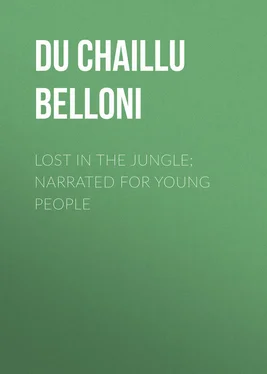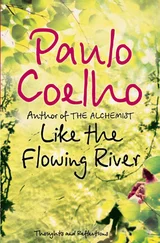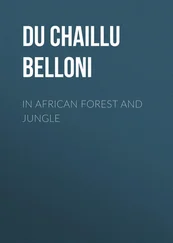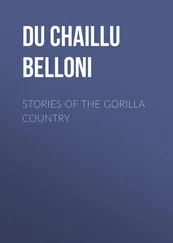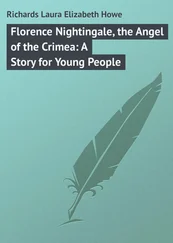Paul Du Chaillu - Lost in the Jungle; Narrated for Young People
Здесь есть возможность читать онлайн «Paul Du Chaillu - Lost in the Jungle; Narrated for Young People» — ознакомительный отрывок электронной книги совершенно бесплатно, а после прочтения отрывка купить полную версию. В некоторых случаях можно слушать аудио, скачать через торрент в формате fb2 и присутствует краткое содержание. Жанр: foreign_antique, foreign_prose, Путешествия и география, на английском языке. Описание произведения, (предисловие) а так же отзывы посетителей доступны на портале библиотеки ЛибКат.
- Название:Lost in the Jungle; Narrated for Young People
- Автор:
- Жанр:
- Год:неизвестен
- ISBN:нет данных
- Рейтинг книги:4 / 5. Голосов: 1
-
Избранное:Добавить в избранное
- Отзывы:
-
Ваша оценка:
- 80
- 1
- 2
- 3
- 4
- 5
Lost in the Jungle; Narrated for Young People: краткое содержание, описание и аннотация
Предлагаем к чтению аннотацию, описание, краткое содержание или предисловие (зависит от того, что написал сам автор книги «Lost in the Jungle; Narrated for Young People»). Если вы не нашли необходимую информацию о книге — напишите в комментариях, мы постараемся отыскать её.
Lost in the Jungle; Narrated for Young People — читать онлайн ознакомительный отрывок
Ниже представлен текст книги, разбитый по страницам. Система сохранения места последней прочитанной страницы, позволяет с удобством читать онлайн бесплатно книгу «Lost in the Jungle; Narrated for Young People», без необходимости каждый раз заново искать на чём Вы остановились. Поставьте закладку, и сможете в любой момент перейти на страницу, на которой закончили чтение.
Интервал:
Закладка:
Day after day I would meet those birds, and then I would look for the monkeys, and was sure to see them. No wonder they are called the monkey-bird. But then I never saw them follow any monkeys but the oshengui. I wondered why they followed them; I could not imagine the reason. I never saw them resting on the birds, but I noticed that these birds were fond of the fruits and berries the oshneguis feed upon. Then the question arose, Did the birds follow the monkeys, or the monkeys the birds? I came to the conclusion that the birds followed the monkeys, whom they could hear telling them, as it were, where they could get food without searching for it.
I tried to discover where these birds made their nests, but never found one in the country of the Rembo.
Now let us come to their companions, the monkeys. How small are these oshenguis! They are the smallest monkeys of that part of Africa. Their color was of a yellowish tinge; they had long, but not prehensile tails, for the monkeys with prehensile tails are found in America. It is a frolicsome and innocent little animal. Strange to say, the common people, who eat all kinds of monkeys, would not eat that one – why, I could not tell. His cry is very plaintive and sad, and is not heard far off, like the cry of other monkeys. As sure as you live, when you meet them hopping about the branches overhead, you may say that water is not far off. They always sleep on trees whose branches overhang a water-course. They all sleep on the same tree. How queer they look, with their tails hanging down! To see the mother carrying her young, and the young clinging to the mother, is a sight worth seeing, for these baby monkeys do not look bigger than rats, and, when quite young, not much bigger than large mice. Strange to say, though very young monkeys can not walk, from the very day they are born they seem to be able to cling with their hands to the breast of their mother; for young monkeys must help themselves, or they would drop to the ground.
So we may say that the oshengui and the monkey-bird are almost inseparable friends, and we must let them wander in the great jungle in search of their food while we look for other birds and animals.
There were also in the forest several varieties of tigercat, the name of which is very similar to that of the little monkeys, the oshengui, I have just spoken to you about.
There are several species of these cats, but I am going to speak to you of the Genetta Fieldiana . You will say, "What a queer name!" Not at all. I have told you that I often remembered him in Africa, and I named this animal after my friend, Mr. Cyrus W. Field. I described this animal in the proceedings of the Boston Natural History Society.
These oshenguis are perfect little plagues. They are very sly; they never sleep at night; they are then wandering in search of prey – of something to kill. They see better at night than in broad daylight. During the day they hide in some hollow tree, or in the midst of a cluster of thick, dead branches, which are so close together that you can not see what is inside. They will crawl in there and remain till night comes. The darker the night, the bolder their deeds; for on a dark night they will come into the villages, knowing that every body is generally asleep between two or three o'clock in the morning, manage to get into some poultry-house – I do not know how – and then pounce upon the poor chickens and strangle them. They will destroy the whole lot of them, suck their blood, and if they can, they will drag one away. If you have a parrot they will try to get at it. Sometimes they will climb trees and get their prey among the birds. The green wild pigeons, the partridges, the wild ducks and cranes, sleeping on the banks of rivers, are good food for them, for they are very fond of the feathered tribe.
One morning, on the banks of a creek not far from our camp, I saw the footprints of an oshengui on the sands. It had been there, I could see, the night before.
I had two or three chickens, which I kept carefully. I wanted to see if I could not get a few eggs, for I had not for a long time tasted any, and I wondered if the oshengui would come and eat my chickens. Poor chickens! they have to look sharp in that country, for they have many enemies among the snakes and the species of wild-cats of the forest, besides the hawks.
The moon was declining, and rose about one o'clock in the morning, and shone just bright enough to enable me to see. So, towards one o'clock, I took one of my chickens and tied it to a stick on the bank of the little creek near our camp, and hid myself, not far off, on the edge of the forest. I took with me two guns, one loaded with bullets in case I should meet larger game I did not bargain for, and the other loaded with shot, which I intended for the oshengui, if it came.
The light from the moon was dim, as I have said, but just enough for me to see. I hoped that the oshengui would come from the direction opposite to where I was. The poor fowl began to cackle, frightened at being in a strange place, and no doubt having an instinctive knowledge of insecurity. It cackled and cackled from time to time, and then would try to go to sleep, but could not; it seemed to comprehend impending danger.
At last I saw something coming along the shore whose eyes were like two bright charcoal fires. It seemed so close to the ground that, if it had not been for the two fiery eyes, I should have thought it was a big snake. The legs were so short and so bent that the body touched the ground. I raised my gun very carefully, and waited. At last I could see the long muzzle of the oshengui. How sly the animal was! He came on like a thief, and so carefully looking right and left as he advanced, but never losing sight of the fowl. The nearer he came, the flatter his body lay on the ground, until it arrived near the fowl; then there was a pause; then a sudden spring upon the fowl – there was just one cry; the fowl was dead. Having aimed carefully, I pulled the trigger – bang! and down rolled the oshengui on his back, with the fowl in his jaws. A tremendous shout rose from our camp. Gambo, Querlaouen, and Malaouen came rushing toward me, and they all cried, "You will kill no more of our fowls now, Oshengui!" With my prize hung above my head, I went to sleep, and the next day we made preparations to go up the river.
CHAPTER VIII
WE ARE IN A CANOE. – OUTFIT FOR HUNTING. – SEE A BEAUTIFUL ANTELOPE. – KILL IT. – IT IS A NEW SPECIES. – RIVER AND FOREST SWALLOWS.
We are now ascending the River Rembo Ovenga. We are in a little canoe, that can be easily hidden in the jungle, and as we ascend the river we meet strange sights, and I can assure you we enjoy our journey. It is true that it is hot, but we can not help it. In the bow of the canoe is a little stick, to which is attached a nice little flag showing the Stars and Stripes. Querlaouen is at the stern, and using his paddle as a rudder; Malaouen is at the head, where he keeps a sharp look-out for wild beasts. I need not say that his gun is close at hand.
Gambo and I have our paddles, and we dip them gently – so gently that, if you had been on the banks of the river at night, you could not have heard us. Near the prow is a smooth-bore gun, loaded with shot, in case we should see some big crane or wild ducks. By my side lies a double-barreled breech-loader, loaded with very large steel-pointed bullets, in case of need, for elephants, crocodiles, leopards, wild buffaloes, and gorillas; or, should we be attacked by the savages inhabiting the country, they were to be used against them. By the side of that gun was a heavy war-axe. Malaouen had his gun by him; Gambo likewise. Our formidable double-barreled breech-loader, with steel-pointed bullets, would smash, I was sure, an elephant's ribs, if the opportunity occurred. We had an extra gun, in case one should get out of order. We had also two cutlasses. We thought we would dispense with a cooking-pot, for all our food was to be roasted on charcoal – that is to say, if we were able to kill any game. In a little box made of tin I had matches, a few flints, and a fire-steel, which were to be used in case the matches should become worthless.
Читать дальшеИнтервал:
Закладка:
Похожие книги на «Lost in the Jungle; Narrated for Young People»
Представляем Вашему вниманию похожие книги на «Lost in the Jungle; Narrated for Young People» списком для выбора. Мы отобрали схожую по названию и смыслу литературу в надежде предоставить читателям больше вариантов отыскать новые, интересные, ещё непрочитанные произведения.
Обсуждение, отзывы о книге «Lost in the Jungle; Narrated for Young People» и просто собственные мнения читателей. Оставьте ваши комментарии, напишите, что Вы думаете о произведении, его смысле или главных героях. Укажите что конкретно понравилось, а что нет, и почему Вы так считаете.
